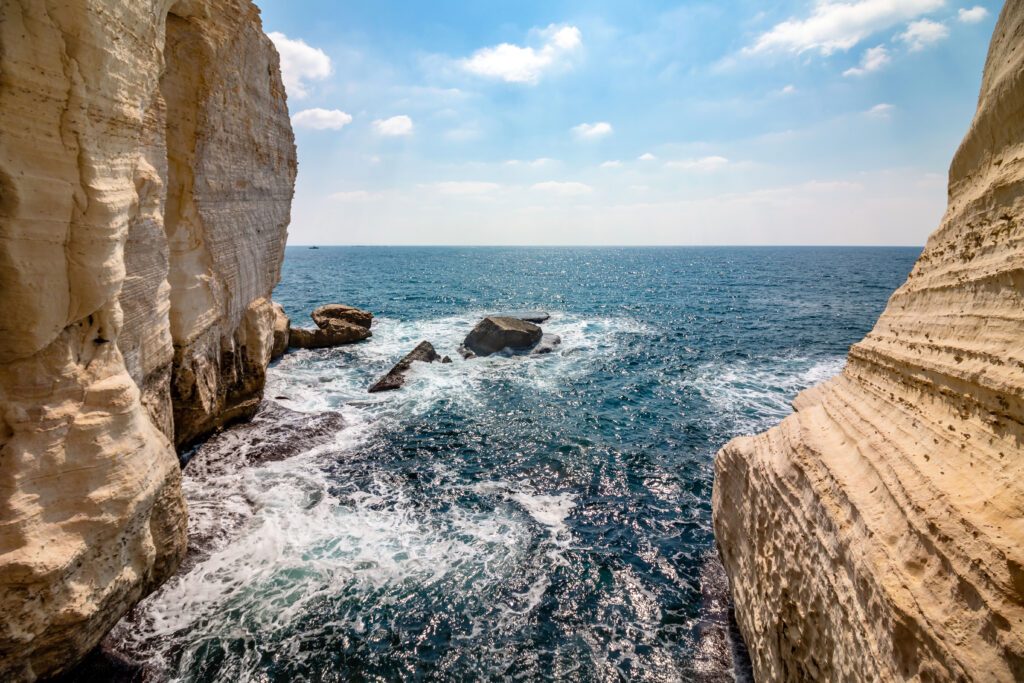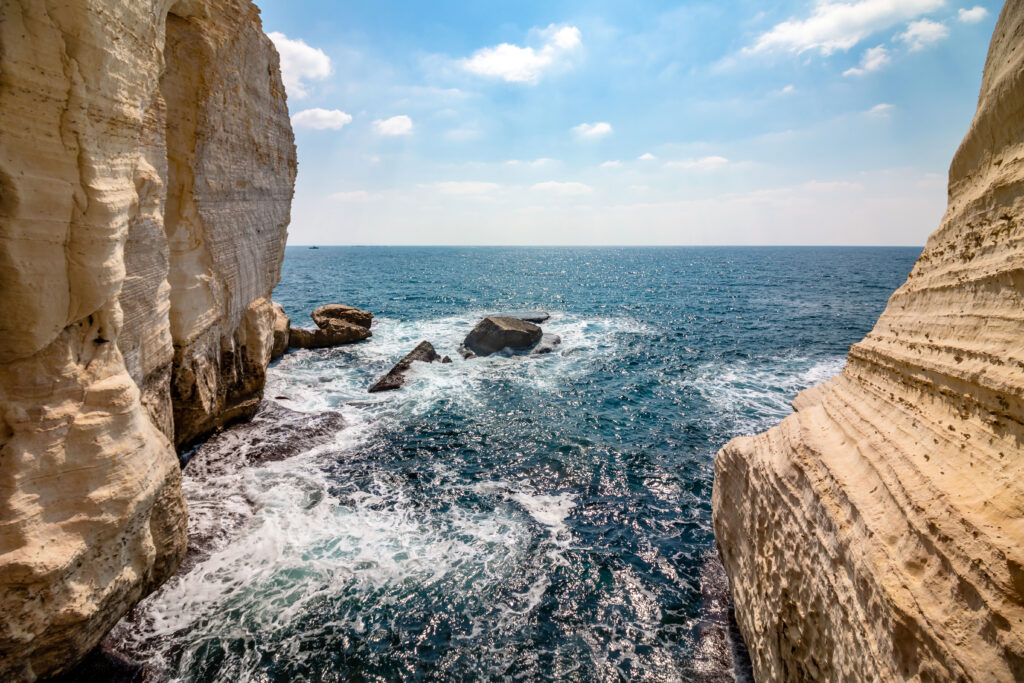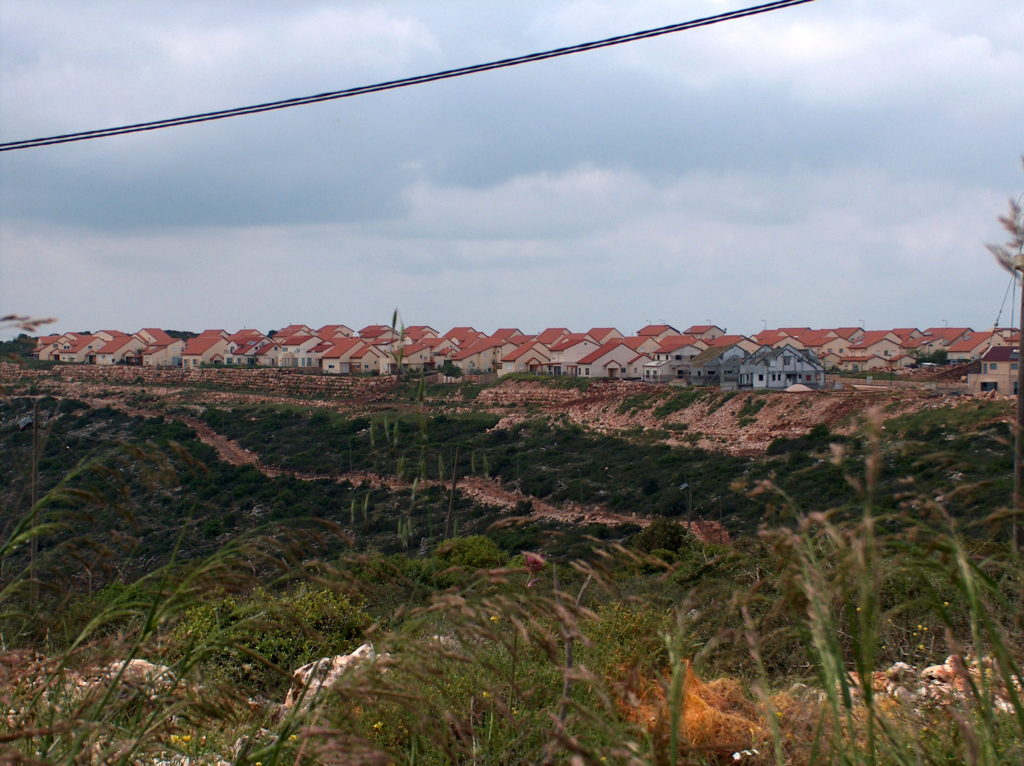
A Year as an Evacuee
We are Shauli and Shirael, married with three daughters: Geula (7), Techelet (5.5), and Shira (1.5). For the past five years, we’ve lived in Kibbutz Rosh Hanikra, driven by a desire to connect with the people of Israel, to deeply understand those different from us, and to believe in the possibility of true unity. We found soulmates in the most beautiful place in the country, and we truly feel that Rosh Hanikra is our home. Shauli served as the rabbi of the synagogue in the kibbutz’s expansion neighborhood. Simchat Torah became our most exciting holiday, and in early October 2023, everyone eagerly awaited the lively and joyous day.
During the holiday prayers, rumors from the south began to spread, and the north also went on alert. After the initial shock throughout the country, on Sunday morning, we were asked to leave the kibbutz for 24 to 48 hours. We packed a bag for three days and left.
After a few days of uncertainty, realizing we wouldn’t be returning within three days, or even a week, we joined the rest of the community at hotels in Tiberias, where we stayed for about four months. No matter how much we try, it’s impossible to fully describe the experience and the mixed emotions we had during that period. It was a time when we disconnected from the outside world, feeling mentally distant and using whatever resources we had just to survive and stay alert to what was happening inside the hotel walls.

We experienced everything extreme situations can bring. There was a mix of people from Kiryat Shmona and kibbutzniks. The hotel lacked laundry facilities, so the Karlin Hasidim from Tiberias set up a laundry system where we received our clothes ironed and cleaned every week. There were endless activities, performances by famous artists, and an abundance of treats from across Israel, regardless of political views. The girls from our kibbutz and Kibbutz Matzuva became like daughters to me, constantly helping me… The hotel became a kind of home, and we all became one family, supporting one another.
After a while, when we noticed that the hotel lobby had become our living room and we had no peace of mind, we realized we needed something else. We needed to gather as a family and return to a normal home life. The overstimulation was affecting our daughters, and we constantly had to keep track of everyone’s whereabouts, ensuring no child wandered off. Add to this the unhealthy food our girls were consuming—our baby even started eating solid food and took her first steps at the hotel!—it was clear we had to leave, and fast.
We desperately searched for a temporary furnished home nearby, so as not to move too far from the community. We were sure that by September, at the latest, we’d be back home. After exhausting other options, we found a sweet, furnished apartment in the settlement of Moreshet—a magical place! But the apartment was brand new and hadn’t yet received approval for outside stairs, so we had to enter through the owners’ house. There was no washing machine connection yet, but the landlady kindly offered to let us use theirs whenever we needed (and after the hotel laundry situation, the machine worked non-stop!). Despite the challenges, we decided to go for it and break free from what felt like a golden cage at the hotel.
Mali and Avi Peretz, the apartment owners, became our anchors as we acclimated to a new place, apartment, and unfamiliar area. They bought everything that was missing for the house—a new sofa, dining chairs, and more. Mali didn’t want us to drag anything from home and provided everything we needed: blankets, pillows, sheets, towels, cutlery, dishes—she thought of every detail. They pampered us as much as possible. Our daughters finally integrated into new, normal frameworks after months of living in evacuee settings.
Meanwhile, friends from our community began leaving the hotel, scattering across the country, from Eilat to Nahariya, truly fulfilling the words of the Sages: “In the generations before the Messiah arrives, the people of the border will wander from city to city…” We celebrated my eldest’s 7th birthday at our landlords’ house and garden, with friends from Rosh Hanikra, the hotel, and Moreshet. There were many girls, and we felt so much love.
It felt strange to adjust to life in a religious settlement after so many years in a secular kibbutz, where diversity and unique connections flourished. But the people of Moreshet welcomed us with open arms, love, and care—even inviting us to light a torch at their Independence Day ceremony.
Our points of light throughout this period, shining through the darkness that often threatened to overwhelm us, are the people of Israel. The warmth, kindness, invitations, and open hearts sustained us during this abnormal time.
With all the love we received, it was still challenging to live in a small apartment. We missed the feeling of home—our furniture, pictures, games, and the space we were used to. Slowly, we realized we wouldn’t be returning home anytime soon, so we moved once again, this time to the sweet moshav of Sde Yaakov in the Jezreel Valley, where friends helped us find a suitable house.
We managed to bring our furniture from Rosh Hanikra and settled in a bit, but the challenges didn’t end—they just changed. Once again, we became “the new ones.” Once again, for the fourth time, our eldest started at a new school. After the hotel became home and Moreshet became family, we’re gathering ourselves, all the mental strength we built over this short yet long period, and we are starting anew.

The Zohar writes that every house move is a soul correction. The people of Israel are undergoing great corrections, in both body and soul, and the Land of Israel is acquired through suffering—something we all feel deeply.
We understand that all the processes we’ve been through are part of God’s precise plan, and each time we look back, we realize how God guided us to the place that was just right for us.
We hope the attacks in the north will end soon and that we’ll be wise enough to deal with Hezbollah before, God forbid, another massacre happens. We pray that the people on the northern border will be able to return home with a sense of security, knowing they don’t have tunnels beneath them.
On the first day of school, I accompanied my eldest daughter, now in second grade. She had studied in three different places during first grade, and here we were again—starting something new for the fourth time. As I watched her, the sense of alienation gnawed at me. One of the teachers approached to introduce herself, and suddenly, tears welled up that I could no longer hold back, after months of keeping it together for my daughters’ sake, trying to give them a sense of stability in such an uncertain reality. The teacher, thinking these were tears of excitement, asked if I was excited. I thought to myself, I wish I could go back to feeling excitement…
We see ourselves as ordinary people, each with our own struggles. There are families dealing with bereavement, injuries, hostages, and burnt homes with nowhere to return to. Yet, if we’re living through this period and facing these trials, we must be stronger than we think. We belong to an infinite greatness and to a redemption that is pushing through, urging us to rise to a different level. To stop focusing on small matters and divisions and instead live here together.
Thank you to our dear people, whose love and kindness are sustaining us through this abnormal time. You are the points of light that shine through our darkness.
With a heartfelt prayer for true and complete redemption, may the promise of “no sword shall pass through your land” and “you shall dwell securely in your land” be fulfilled, Amen.
This essay was originally published in Hebrew in Karov Eilecha.
Please support displaced Israeli families. They need our help!
The post A Year as an Evacuee appeared first on Israel365 News.
Israel in the News